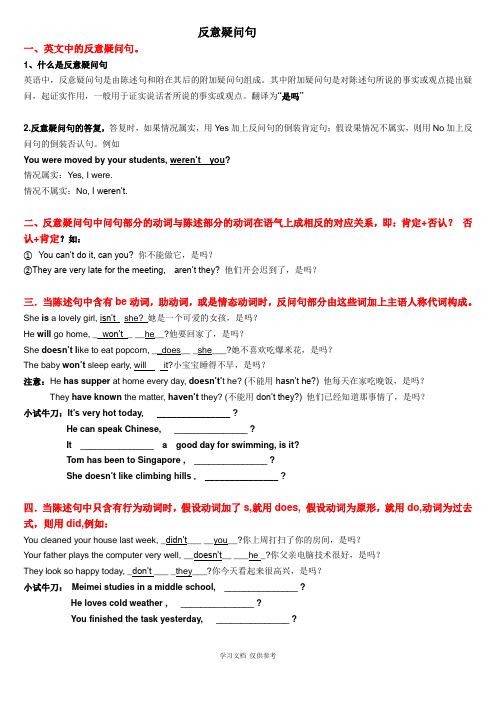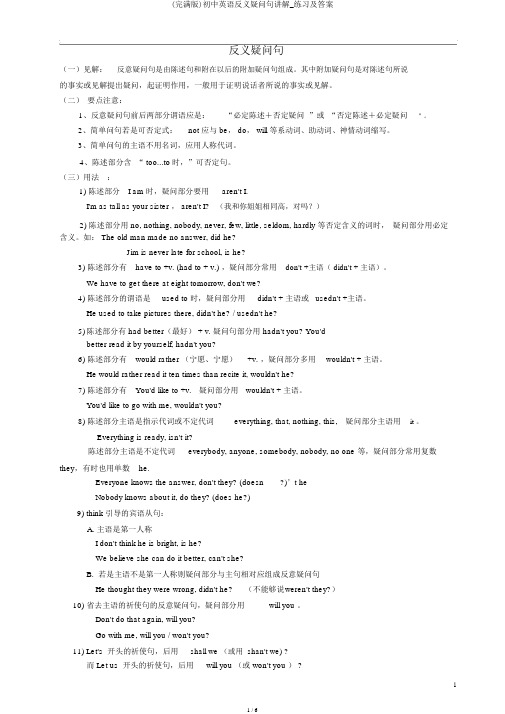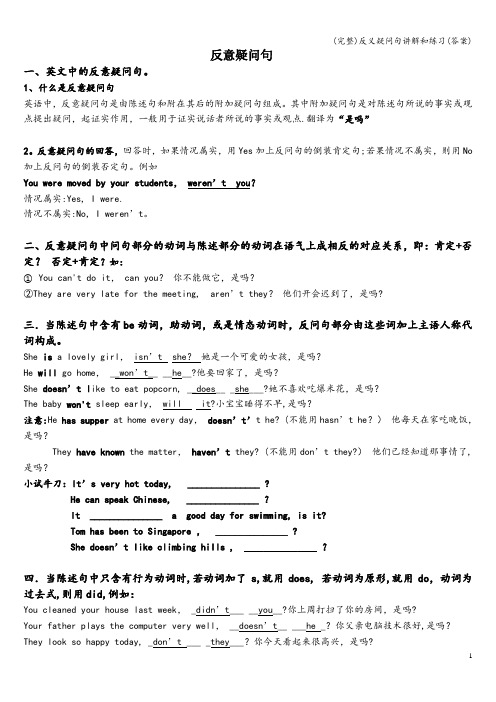反义疑问句讲解以及练习题
反义疑问句详细讲解及习题及答案

反义疑问句一.句型解释反义疑问句(The Disjunctive Question):即附加疑问句。
它表示提问人的看法,没有把握,需要对方证实。
反义疑问句由两部分组成:前一部分是一个陈述句,后一部分是一个简短的疑问句,两部分的人称时态应保持一致。
1.陈述部分肯定式+疑问部分否定式2.陈述部分否定式+疑问部分肯定式She was ill yesterday, wasn’t she?You didn’t go, did you?二.特殊的句型1.祈使句。
祈使句后一般加上will you或won't you构成反意疑问句,用will you 多表示“请求”,用won't you 多表示提醒对方注意。
例如:Let引导的祈使句有两种情况:1) Let's...,后的反意疑问句用shall we或shan't we。
例如:Let's go home, shall we/ shan't we? 回家吧,好吗?2)Let us/me...后的反意疑问句用will you或won't you。
例如:Let me have a try, will you/won't you?3)祈使句都用will you 或won’t you2.当陈述部分含I think (believe, suppose...)that... 结构时,其反意疑问句须与从句的主、谓语保持一致,注意主句的主语必须是第一人称。
例如:I don't think he will come, will he?若是非第一人称,则与主句的主语相一致He thinks that she will come, doesn’t he?反意疑问句的陈述部分为I(We) don’t think(believe, suppose, consider)+ that从句时,从句为否定意义,问句部分的动词和主语仍与that从句保持一致且用肯定式。
反义疑问句详细讲解及习题及答案

反义疑问句一.句型解释反义疑问句(The Disjunctive Question):即附加疑问句。
它表示提问人的看法,没有把握,需要对方证实。
反义疑问句由两部分组成:前一部分是一个陈述句,后一部分是一个简短的疑问句,两部分的人称时态应保持一致。
1.陈述部分肯定式+疑问部分否定式2.陈述部分否定式+疑问部分肯定式She was ill yesterday, wasn’t she?You didn’t go, did you?二.特殊的句型1.祈使句。
祈使句后一般加上will you或won't you构成反意疑问句,用will you 多表示“请求”,用won't you 多表示提醒对方注意。
例如:Let引导的祈使句有两种情况:1) Let's...,后的反意疑问句用shall we或shan't we。
例如:Let's go home, shall we/ shan't we? 回家吧,好吗?2)Let us/me...后的反意疑问句用will you或won't you。
例如:Let me have a try, will you/won't you?3)祈使句都用will you 或won’t you2.当陈述部分含I think (believe, suppose...)that... 结构时,其反意疑问句须与从句的主、谓语保持一致,注意主句的主语必须是第一人称。
例如:I don't think he will come, will he?若是非第一人称,则与主句的主语相一致He thinks that she will come, doesn’t he?反意疑问句的陈述部分为I(We) don’t think(believe, suppose, consider)+ that从句时,从句为否定意义,问句部分的动词和主语仍与that从句保持一致且用肯定式。
反义疑问句练习题及答案解析

反义疑问句练习题及答案解析反义疑问句是英语语法中的一种问句形式,用于在表达某种观点或态度时,征求对方的认同或否认。
反义疑问句通常由两个部分组成,主句和从句,其中主句陈述事实,并以逗号结尾,从句是对主句的反问。
以下是一些反义疑问句的练题及答案解析:1. He is a doctor, isn't he?答案:是解析:句子的主语是 "He",陈述了 "He" 是一个医生。
主句以逗号结尾,从句表达了 "He" 是一个医生这一观点,并征求对方的认同。
2. They don't like coffee, do they?答案:否解析:句子的主语是 "They",陈述了 "They" 不喜欢咖啡。
主句以逗号结尾,从句表达了 "They" 不喜欢咖啡这一观点,并征求对方的否认。
3. You can swim, can't you?答案:是解析:句子的主语是 "You",陈述了 "You" 能游泳。
主句以逗号结尾,从句表达了 "You" 能游泳这一观点,并征求对方的认同。
4. She hasn't finished her homework, has she?答案:否解析:句子的主语是"She",陈述了"She" 没有完成她的作业。
主句以逗号结尾,从句表达了 "She" 没有完成她的作业这一观点,并征求对方的否认。
5. He won't be late, will he?答案:否解析:句子的主语是 "He",陈述了 "He" 不会迟到。
主句以逗号结尾,从句表达了"He" 不会迟到这一观点,并征求对方的否认。
反义疑问句讲解和练习(答案)

反意疑问句一、英文中的反意疑问句。
1、什么是反意疑问句英语中,反意疑问句是由陈述句和附在其后的附加疑问句组成。
其中附加疑问句是对陈述句所说的事实或观点提出疑问,起证实作用,一般用于证实说话者所说的事实或观点。
翻译为“是吗”2.反意疑问句的答复,答复时,如果情况属实,用Yes加上反问句的倒装肯定句;假设果情况不属实,则用No加上反问句的倒装否认句。
例如You were moved by your students, weren’t you?情况属实:Yes, I were.情况不属实:No, I weren’t.二、反意疑问句中问句部分的动词与陈述部分的动词在语气上成相反的对应关系,即:肯定+否认?否认+肯定?如:①You can’t do it, can you? 你不能做它,是吗?②They are very late for the meeting, aren’t they? 他们开会迟到了,是吗?三.当陈述句中含有be动词,助动词,或是情态动词时,反问句部分由这些词加上主语人称代词构成。
She is a lovely girl, isn’t she? 她是一个可爱的女孩,是吗?He will go home, __won’t__ __he__?他要回家了,是吗?She doesn’t l ike to eat popcorn, __does__ _she___?她不喜欢吃爆米花,是吗?The baby won’t sleep early, will it?小宝宝睡得不早,是吗?注意:He has supper at home every day,doesn’t’t he? (不能用hasn’t he?) 他每天在家吃晚饭,是吗?They have known the matter, haven’t they? (不能用don’t they?) 他们已经知道那事情了,是吗?小试牛刀:It’s very hot today, _______________ ?He can speak Chinese, _______________ ?It _______________ a good day for swimming, is it?Tom has been to Singapore , _______________ ?She d oesn’t like climbing hills , _______________ ?四.当陈述句中只含有行为动词时,假设动词加了s,就用does, 假设动词为原形,就用do,动词为过去式,则用did,例如:You cleaned your house last week, _didn’t___ __you__?你上周打扫了你的房间,是吗?Your father plays the computer very well, __doesn’t__ ___he _?你父亲电脑技术很好,是吗?They look so happy today, _don’t ___ _they___?你今天看起来很高兴,是吗?小试牛刀:Meimei studies in a middle school, _______________ ?He loves cold weather , _______________ ?You finished the task yesterday, _______________ ?五.反意疑问句的陈述部分带有little, few, never, hardly, seldom,nobody, nothing, barely, scarcely 等否认意义的词时,问句部分用肯定式。
反义疑问句讲解及练习题

反义疑问句讲解及练习题1.祈使句。
祈使句后一般加上will you或won't you构成反意疑问句,用will you 多表示“请求”,用won't you 多表示提醒对方注意。
例如:Look at the blackboard, will you/ won't you看黑板,好吗Let引导的祈使句有两种情况:1)Let's...,后的反意疑问句用shall we或shan't we。
例如:Let's go home, shall we/ shan't we 回家吧,好吗还可以用may I来表示征求对方的同意或许可。
2)Let us/me...后的反意疑问句用will you或won't you。
例如:Let me have a try, will you/won't you 让我试一试,行吗2.感叹句。
感叹句后加反意疑问句时,其反意疑问句需用be的一般现在时态的否定形式。
例如:>What fine weather, isn't it 多好的天气啊,是吧3. 当陈述部分谓语动词是need, dare, used to,且这些词被用作实义动词时,其反意疑问句需用do的适当形式。
例如:He needs help, doesn't he他需要帮助,是吗4.陈述部分主、谓语是I am...时,反意疑问句用aren't I 或ain't I ,而不是am not I (可用am I not)。
例如:I'm working now, ain't I 我在工作,是吗5.陈述部分的主语是everything, nothing, anything或something 时,反意疑问句的主语应用代词it。
例如:Something is wrong with my radio, isn't it 我的收音机出毛病了,是吧。
反义疑问句讲解与练习

反义疑问句讲解与练习一、含be(is, are, was, were)动词的反意疑问句(1)句型1:主语+ be+其它,isn’t(aren’t, wasn’t, weren’t)+ 主语?句型2:主语+ be not+其它,is(are, was, were) + 主语?① You are from America, aren’t you? Yes, I am. No, I’m not.② It isn’t very cold today, is it? Yes, it is. No,it isn’t.(2)注意:There be句型例:There is an old picture on the wall, isn’t there?二、带行为动词反意疑问句(不含be和情态动词)句型1:主语+动词+其他,do/did/does + not +主语?句型2:主语+did/does/do+not +动词原形+其他,did/do/does+其他?例:You often watch TV in the evening, don’t you? Yes, I do. No, I don’t.三、含有情态动词的反意疑问句,反义疑问句中的动词使用情态动词。
例:The students must study hard, mustn’t they? Yes, they must. No, they needn’t.注意:You must go home now, needn’t you? Yes, I must. No, I needn’t.★注意:There be句型的一般将来时① There will be a basketball match tomorrow, won’t there?Yes, there will. No, there won’t.② There won’t be too much pollution in the future, will there?Yes, there will. No, there won’t.四、反义疑问句的回答:答语要和实际情况相符合,遵循“实事求是”的原则。
(完整版)初中英语反义疑问句讲解_练习及答案

反义疑问句(一)见解:反意疑问句是由陈述句和附在以后的附加疑问句组成。
其中附加疑问句是对陈述句所说的事实或见解提出疑问,起证明作用,一般用于证明说话者所说的事实或见解。
(二)要点注意:1、反意疑问句前后两部分谓语应是:“必定陈述+否定疑问”或“否定陈述+必定疑问”。
2、简单问句若是可否定式:not 应与 be, do, will 等系动词、助动词、神情动词缩写。
3、简单问句的主语不用名词,应用人称代词。
4、陈述部分含“ too...to时,”可否定句。
(三)用法:1) 陈述部分I am 时,疑问部分要用aren't I.I'm as tall as your sister , aren't I?(我和你姐姐相同高,对吗?)2) 陈述部分用 no, nothing, nobody, never, few, little, seldom, hardly 等否定含义的词时,疑问部分用必定含义。
如: The old man made no answer, did he?Jim is never late for school, is he?3) 陈述部分有have to +v. (had to + v.) ,疑问部分常用don't +主语( didn't + 主语)。
We have to get there at eight tomorrow, don't we?4) 陈述部分的谓语是used to 时,疑问部分用didn't + 主语或usedn't +主语。
He used to take pictures there, didn't he? / usedn't he?5)陈述部分有 had better(最好) + v. 疑问句部分用 hadn't you? You'dbetter read it by yourself, hadn't you?6) 陈述部分有would rather (宁愿、宁愿)+v. ,疑问部分多用wouldn't + 主语。
(完整)反义疑问句讲解和练习(答案)

反意疑问句一、英文中的反意疑问句。
1、什么是反意疑问句英语中,反意疑问句是由陈述句和附在其后的附加疑问句组成。
其中附加疑问句是对陈述句所说的事实或观点提出疑问,起证实作用,一般用于证实说话者所说的事实或观点.翻译为“是吗”2。
反意疑问句的回答,回答时,如果情况属实,用Yes加上反问句的倒装肯定句;若果情况不属实,则用No 加上反问句的倒装否定句。
例如You were moved by your students,weren’t you?情况属实:Yes, I were.情况不属实:No, I weren’t。
二、反意疑问句中问句部分的动词与陈述部分的动词在语气上成相反的对应关系,即:肯定+否定?否定+肯定?如:①You can't do it, can you?你不能做它,是吗?②They are very late for the meeting, aren’t they?他们开会迟到了,是吗?三.当陈述句中含有be动词,助动词,或是情态动词时,反问句部分由这些词加上主语人称代词构成。
She is a lovely girl,isn’t she?她是一个可爱的女孩,是吗?He will go home, __won’t__ __he__?他要回家了,是吗?She doesn’t l ike to eat popcorn, __does__ _she___?她不喜欢吃爆米花,是吗?The baby won't sleep early, will it?小宝宝睡得不早,是吗?注意:He has supper at home every day,doesn’t’t he? (不能用hasn’t he?)他每天在家吃晚饭,是吗?They have known the matter,haven’t they? (不能用don’t they?)他们已经知道那事情了,是吗?小试牛刀:It’s very hot today, _______________ ?He can speak Chinese, _______________ ?It _______________ a good day for swimming, is it?Tom has been to Singapore , _______________ ?She do esn’t like climbing hills , _______________ ?四.当陈述句中只含有行为动词时,若动词加了s,就用does, 若动词为原形,就用do,动词为过去式,则用did,例如:You cleaned your house last week, _didn’t___ __you__?你上周打扫了你的房间,是吗?Your father plays the computer very well, __doesn’t__ ___he _?你父亲电脑技术很好,是吗?They look so happy today, _don’t ___ _they___?你今天看起来很高兴,是吗?小试牛刀: Meimei studies in a middle school, _______________ ?He loves cold weather , _______________ ?You finished the task yesterday, _______________ ?五.反意疑问句的陈述部分带有little, few, never, hardly, seldom,nobody, nothing,barely, scarcely等否定意义的词时,问句部分用肯定式.如:①She never tells a lie, does she?(不用doesn’t she?)她从不说谎,是吗?②He was seldom late, was he?(不用wasn’t he?) 他几乎不迟到,是吗?小试牛刀:Few students can answer the question, _______________ ?He can hardly finish his homework, _______________ ?六、反意疑问句的陈述部分为I am……时,问句部分习惯上用aren’t I?表示.如:I am a very honest man, aren’t I? 我是个很诚实的人,是吗?小试牛刀:I’m in Class 3,Grade 2, _______________ ?I’m ten years old, _______________ ?七.陈述部分的主语为不定代词something, anything, nothing, everything时,问句部分的主语用it。
- 1、下载文档前请自行甄别文档内容的完整性,平台不提供额外的编辑、内容补充、找答案等附加服务。
- 2、"仅部分预览"的文档,不可在线预览部分如存在完整性等问题,可反馈申请退款(可完整预览的文档不适用该条件!)。
- 3、如文档侵犯您的权益,请联系客服反馈,我们会尽快为您处理(人工客服工作时间:9:00-18:30)。
反义疑问句讲解:一:基本知识(1)什么是反义疑问句?举个例子。
(2)结构:“肯定陈述+否定疑问”或“否定陈述+肯定疑问”(前肯后否or前否后肯)(3)两部分时态、人称应一致(人称需要用主格)。
She was ill yesterday, wasn’t she? You didn’t go, did you?(4)简略问句如果是否定式,not应与be,do,will等系动词、助动词、情态动词缩写,不能出现not。
(5)简略问句的主语不用名词,应用人称代词,不能出现名词。
*练习:写出下列句子的反义疑问句:1.It looks like rain, ________________________?2.He doesn’t need to work so late,_____________________?3. She felt so bad yesterday ,______________________?4. Mr.Li will go to Paris,__________________________?二:知识升华(6) everything,anything,nothing,something时,附加疑问句中主语用it 不用they(7)this,that,或those,these时,附加疑问句中主语用it和they.(8)在there be句型中,附加疑问句中主语一般用be/情态动词/助动词+there(9)陈述句中含有not, no, hardly, neither, never, few, little, too…to等否定词或具有否定意义的词时,疑问部分常用肯定形式。
如:(10)如果主语是l’m,后反意部分用aren’t l(11)对反意疑问句的回答,是根据事实,而不是根据问题的提法。
He isn‘t a doctor, is he ? (他不是医生,是吗?)Yes,_____________________. He ___________(is/isn’t) a doctor.No, _________________________. He ______________(is/isn’t) a doctor.*练习:写出下列句子的反义疑问句:1. Nothing happened last night,__________________________?2. This is what I want ,____________________?3. Those are my pens, ____________________?4. There is something gone,__________________?5. There will be a meeting tomorrow,___________________?6. There seems to be some new books,___________________?7. Few people knew the news, _________________?8. Tom has never been to England,_________________________?9. l’ m late , _________________________?10.---Mary likes drawing, doesn’t she?---_____, she____________. She draws pictures every day!三、表示主语主观意愿的词含有think, believe, suppose, imagine, expect等动词后接宾语从句构成的主从复合句在构成反意疑问句时,视情况不同有两种不同的构成方式。
(1.)当主句的主语为第一人称时,其后的简短问句应与从句相一致。
例如:I expect our English teacher will be back this weekend,________________?We suppose you have finished the project,_____________________?值得注意的是,当这些动词后接的宾语从句的否定转移到主句时,其仍属否定句,故其后的简短问句应用肯定式,而非否定式。
例如:I don't believe that he can translate this book, ______________?Wedon't imagine the twins have arrived, _____________________? (2).当主句的主语为第二、三人称时,其后的简短问句则应与主句相一致(此时,否定只看主句,与从句无关...)。
[但如果主句的时态是过去时等等,疑问句应和主句的人称时态保持一致。
]例如:Your sister supposes she needs no help, _________________?You thought they could have completed the project,_________________?They don't believe she's an engineer, __________________?She doesn't expect that we are coming so soon, __________________? 四、祈使句当陈述部分是祈使句时,疑问句要根据语气来表达当开头是Let‘s时,一定要用shall we。
其余都用will you(包括 Let us)不论肯定否定Let’s go out for a walk, _______________?Let us go out for a walk, _________________?Turn on the radio, _________________?*特殊情况: Let me help you,may I?反义疑问句练习题1. He likes apples, ___________?A. is heB. isn’t heC. does heD. doesn’t he2. He has little money, ____________?A. hasn’t heB. is heC. does heD. doesn’t he3. My brother hardly recognized you, __________?A. did my brotherB. did heC. didn’t my brotherD. was he4. There is little water in the bottle, _________?A. is itB. isn’t itC. is thereD. isn’t there5. There will be a meeting this afternoon, _______?A. is itB. will thereC. isn’t itD. won’t there6. They won’t come to have dinner with us, ________?A. do theyB. would theyC. won’t theyD. will they7. Mrs. Black doesn’t believe so many people are suffering from this tsunami(海啸), _____?A. aren’t theyB. are theyC. doesn’t sheD. does she8. I don’t think he could have done such a stupid thing last night, _____?A. do IB. could heC. did heD. has he9. It’s the first time that she has been to the United States, _____?A. isn’t sheB. isn’t itC. hasn’t sheD. hasn’t it10. When the disaster struck, many people had no time to escape being killed, _____?A. didn’t theyB. did theyC. did itD. didn’t it11. There’s not much news about the missing mountain climbers in today’s newspaper,_____?A. isn’t itB. is itC. isn’t thereD. is there12. I am very excited to know “S.H.E.”is going to sing at the CCTV Spring FestivalSoiree, _____?A. aren’t IB. am not IC. aren’t youD. are yo u13. Let’s take action together to make our city more beautiful, _____?A. won’t weB. don’t weC. shall weD. won’t you14. So you don’t want to enter for the 2005 college entrance examination(高考),_____?A. don’t youB. do youC. won’t youD. will you15.---Your mom is a teacher, isn’t she?---_______________. She teaches English.A.Yes, she doesn’t.B.Yes, she does.C.No, she does.D. No, she doesn’t.。
